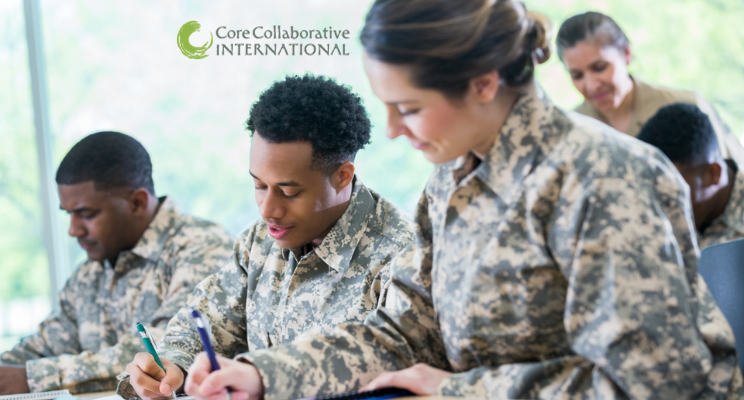CoreCollaborative International has been hired to provide intercultural assessment expertise on a pilot conducted by the Department of Defense (DoD)’s Defense Language and National Security Education Office, or DLNSEO. Together with the Institute for International Education (IIE), DLNSEO manages the Project Global Officer (GO) initiative, which funds ROTC cadets to pursue opportunities in critical language education, overseas study, and cross-cultural experience.
Project GO’s mission is to increase the number of ROTC students who study critical languages. Participants in the program complete a minimum of four semesters of the same language and study abroad for eight weeks or longer. The program’s goal is to “develop future military officers within all of the US Armed Forces who possess the necessary linguistic and cross-cultural communication skills required for effective leadership in the 21st-century operational environment.” Since 2007, Project GO has enabled approximately 6,500 students to pursue study in 19 different languages and cultures, both domestically and abroad in 33 countries around the world.
Helping students acquire expertise in a specific language and region – what is known as “culture-specific” knowledge – has been at the heart of the Project GO initiative. In recent years, though, Project GO has also sought to incorporate into its mission the acquisition of cross-cultural communication skills, the “culture-general” knowledge and skills needed to operate with competence across multiple cultures. A US Army Research Institute for the Behavioral and Social Sciences report puts it this way: “Whereas language and regional expertise provide the depth to operate in a specific culture, cross-cultural competence provides leaders the breadth to operate in any culture.”
Beyond an interest in students’ acquiring culture-general knowledge, Project GO’s leadership team at DLNSEO also became interested in measuring that knowledge. It developed a plan to target and assess students’ cross-cultural gains during their Project GO experience, using a variety of intercultural instruments. For intercultural assessment expertise in this initiative, DLNSEO reached out to Dr. Jennifer Wiley, CCI’s Managing Partner. Dr. Wiley was hired to oversee the program’s two pilot years (2022 and 2023), which involved 19 Project GO institutions in Year One, and 27 in Year Two. Each institution was invited to choose an intercultural instrument – the Beliefs, Events, and Values Inventory (BEVI), the Intercultural Development Inventory (IDI), or the Individual Cultural Mindset Inventory (ICMI) – and administer it to Project GO students in their summer language programs. Students typically engage with the instrument three times: the T1 takes place prior to their language training, T2 after the training, and then again a T3 is administered six months following the training.
The CCI team, led by Dr. Wiley, has been providing all necessary support to the participating institutions, DLNSEO and IIE. The work has been multifaceted over its two years.
In Year One, CCI helped the stakeholders identify DoD Cultural Competency Guidelines and facilitated discussions to align these guidelines with Project GO goals. Support was provided for institutional program coordinators and directors as they undertook assessment training and then deployed their instruments of choice to their language students. Once the institutions completed their initial data collection, CCI aggregated and analyzed the data, creating a framework for making collective sense of data from these three different instruments. CCI worked with each partner institution to understand how they experienced the instrument they used and also presented research and facilitated group discussions regarding assessment and facilitation of cultural awareness activities. CCI created a mini-course designed for student cultural reflection, which partner institutions used in the summer of 2023. Also during the summer, assessment onboarding was offered for institutions in one-on-one or small group sessions. Finally, CCI assisted stakeholders in identifying how the results from the data can be useful in designing intercultural curricular materials that would enhance intercultural growth in participants.
In Year Two, the work of identifying and addressing cultural awareness changes in cadets has continued, with increased attention to further work needed to identify target outcomes for cultural awareness. A single dataset is being created, cleaned, coded, and organized. The dataset was analyzed and presented, first to DLNSEO and IIE teams, and then at the annual conference in November 2023. Assessment data from each instrument will be used in a variety of ways, but in general, it will help participating institutions understand their populations better, which will allow them to:
- Set realistic goals
- Create programming that is differentiated for higher effectiveness
- Help learners set benchmarks for growth
- Create cohesive teams
- Inform program evaluations, and
- Guide program policies and procedures.
CCI’s unique role in the Project GO cultural assessment project is supporting both partner universities (as they seek to improve student outcomes) and US government stakeholders (as they support national security interests by improving intercultural growth in ROTC cadets). The CCI team has years of experience in developing intercultural capacity in multiple contexts and for multiple populations. The common denominator is CCI’s approach, which is at once responsive to the needs of stakeholders overseeing the work, as well as of the diverse institutional partners and learners who engage in it. Contact CoreCollaborative International to learn how the CCI team’s approach to intercultural capacity development can benefit your organization.
